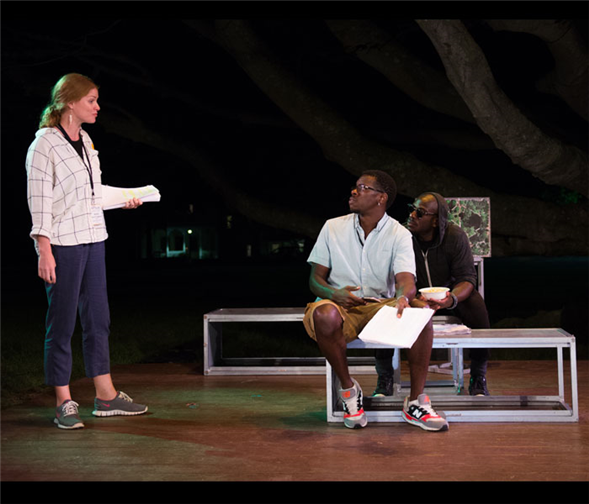Translate Page

Topical, urgent plays should be developed (and produced) quickly
---
An innocent black man is harassed, profiled, and beaten by police in an American town riven by racial and class division. Protesters march; violence erupts.
That's the premise for Running on Fire, Aurin Squire's searing new play-in-progress. I saw a workshop production last month at the Eugene O'Neill Theater Center, just hours after police killed two unresisting black men in Minnesota and Louisiana, the latest in a long, horrific string of similar events. As in Squire's play, Facebook videos played a critical role in igniting national outrage.
The very next morning, I awoke to still grimmer news on the radio: the sound of gunshots recorded in Dallas during a peaceful protest of those killings. Five police officers were killed in the ambush, others wounded in what could have been a scene from Running on Fire.
For the next few days, those of us at the O'Neill couldn't stop talking about the play and how it shed light on the events that were roiling the nation. It's been years — maybe since Clybourne Park's portrayal of the complexities of gentrification — since I saw a work of art that felt so immediately relevant to my world today.
Isn't that what we want art to do — speak to society's deepest and most urgent issues? For those few of us who saw it, Running on Fire could and did help us understand and emotionally process the terrible events of those few days. But there's no realistic chance that others will be able to see the show until months (or maybe years) after the news has grown cold.
Meanwhile, the world races by at the speed of a tweet. Heated discussions about today's racial justice crisis are constantly ricocheting around the internet and pulsating through political campaigns. All of them could be bolstered or complicated by the insights Running on Fire could provide and the responses it would provoke.
But for the play to make an impact, someone would have to trust it right now, as it is. And this flies in the face of America's typical development model for new plays, which often requires scripts to be workshopped and refined for years before they finally get in front of an audience. (Here's a look at why this process is known as development hell)
{Image1}
Play development is unquestionably important, of course, since it behooves everyone from playwrights to audiences for scripts to be polished. Like every other nascent work for the stage, Squire's will likely benefit from refinement and reworking.
But how long should a play gestate? As playwright Christopher Hampton recently said, "I think the problem for writers is your play tends to get workshopped to death. These are the things that people haven't done before or said before or expressed in this particular way, and people are alarmed. And they should be. My fear [is] that it all takes away those jagged edges that really cut into the audience."
As Hampton suggests, those jagged edges are what get people talking, and plenty of today's American theatremakers are using them to prod everything from homelessness to homophobia, from racism to sexism to militarism to capitalism to (very soon, perhaps) Trumpism. When such plays, conceived in the heat of the moment, appear, I hope producers and presenters will expedite the development process, catch the spark while it's still ablaze, and get these shows out to the people who need to experience them. In such cases, timely passion should supersede the quest for perfection.
In its current form Running on Fire already crackles with visceral immediacy and in-your-face intimacy. However, if it takes five or more years for Squire's thoughts and arguments to reach my hometown, or even Broadway, the play's impact will be vitiated. The country will be deprived of a vital way to grapple with this unavoidable issue. If there is going to be more development, let it happen fast. America needs to see Running on Fire right now. Not three years from now.
---
Brett Campbell, a 2016 O'Neill Fellow at the National Critics Conference, covers the arts for Oregon ArtsWatch, The Wall Street Journal, San Francisco Classical Voice, and many other publications. He lives in Portland, Oregon.
Photos by Isaak Berliner. Top photo: A scene from the workshop performance of Running on Fire at the Eugene O'Neill Theater Center.